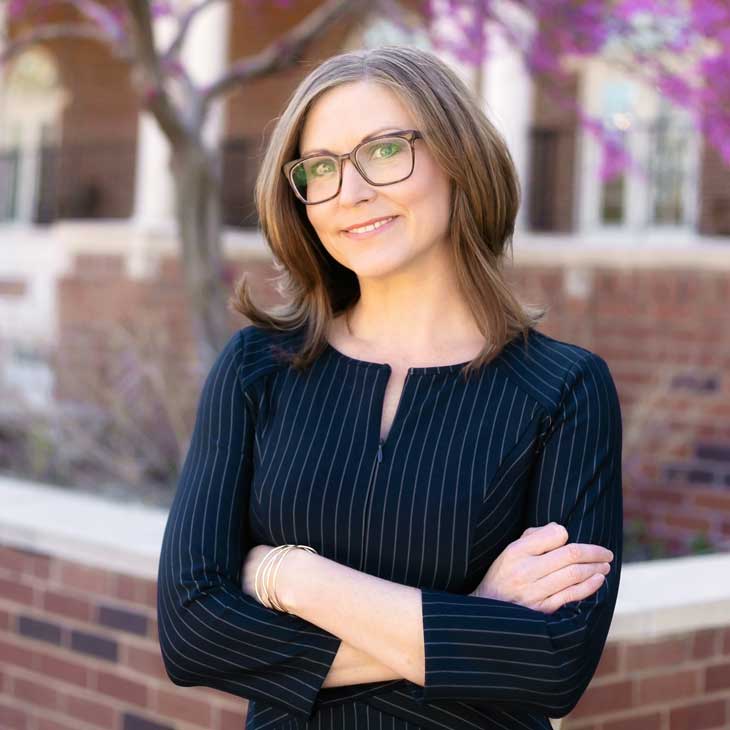
Karibo selected as 2024-25 Fulbright US Scholar for Canada
Monday, June 3, 2024
Media Contact: Sydney Trainor | Communications and Media Relations Specialist | 405-744-9782 | sydney.trainor@okstate.edu
Dr. Holly Karibo, an associate professor and director of graduate studies in Oklahoma State University’s Department of History, has been selected as a 2024-25 Fulbright Canada Research Chair in Comparative Canada-U.S. Studies.
Karibo will research borderlands history for four months at Trent University in Peterborough, Ontario.
“I’m excited to begin primary archival research on a new research project titled, ‘Ladies, Liquor, and the National Line: Gendering Prohibition in the Great Lakes Borderlands,’” Karibo said. “I’m trying to uncover some of the histories of female smugglers and people that were involved in bootlegging and cross-border illegal trades in the 1920s and 1930s, but whose stories have not yet been told.”
She will be looking at states and provinces that meet around the U.S.-Canada border, like Michigan, New York, Ontario and Quebec, as well as indigenous communities that straddle that national line.
She will be looking at the states and provinces that meet around the U.S.-Canada border, like Michigan, New York, Ontario and Quebec, as well as indigenous communities that also straddle that national line.
Karibo and Dr. Javier Vilcáez from the College of Arts and Sciences, along with Dr. Norb Delatte from the College of Engineering, Architecture and Technology, have been named 2024-25 Fulbright Scholars from OSU.
The idea for this project sprouted when Karibo came across several 1920s news articles about how many women acted as smugglers and evaded arrest by using gender stereotypes of them as the ‘fairer sex’ to evade customs agents.
She is interested in learning about the experiences of a diverse range of women who became involved in the illegal trade on each side of the national line. She will also examine how the policing of women during Prohibition reshaped the U.S. and Canadian legal systems in important ways.
“For my own research, this is an amazing chance to dig into some archives and historical collections I haven’t used in the past,” Karibo said. “But it's also an important opportunity to build connections with students and faculty at Ontario universities, and I hope to sustain those connections beyond my time as a Fulbright scholar.”
Karibo studied in Canada at the University of Toronto, earning her Ph.D. (2012) and M.A. (2007) there, and the University of Guelph, where she earned her bachelor's degree (2006) in history and women's studies. This Fulbright experience is an opportunity for her to go back to Canada for both archival research and teaching.
At OSU, Karibo conducts transdisciplinary research by combining her degrees in history and women and gender studies. She teaches the U.S. survey courses, as well as classes on gender in America, the history of North American borderlands, power and protest in U.S. history, U.S. cultural history post-1865 and more.
Karibo is also set to publish a new book with University of Texas Press in November that continues to dive into her research on illegal economies, titled “Rehab on the Range: A History of Addiction and Incarceration in the American West.”
“There were only two federally funded drug treatment centers in all of the United States between the 1930s and 1970s. One was in Lexington, Kentucky, but the other one that treated people west of the Mississippi was in Fort Worth, Texas,” Karibo said. “So, I use that institution to look at how the history of medical treatment and the rise of incarceration and war on drugs gets fused at these federal institutions, which took voluntary patients, but also prisoner patients.”
Fulbright Scholar Awards are prestigious and competitive fellowships that provide
unique opportunities for scholars to teach and conduct research abroad. Fulbright
scholars also play a critical role in U.S. public diplomacy, establishing long-term
relationships between people and nations.
“The Fulbright Program wants you to build connections in the long term between institutions,” Karibo said. “My particular fellowship does include teaching one seminar, like a small seminar on my research and area of expertise, so I'm teaching on illegal economies in the U.S., Canada, U.S. Mexico border, doing some comparative history there. Then, you give a public lecture, you engage with other classes that invite you. It's a way to reach out and get to know both faculty and students through the process.”
